
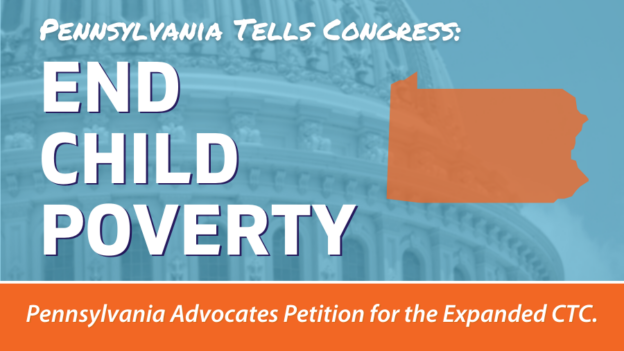
Pennsylvania Advocates for the Expanded Child Tax Credit



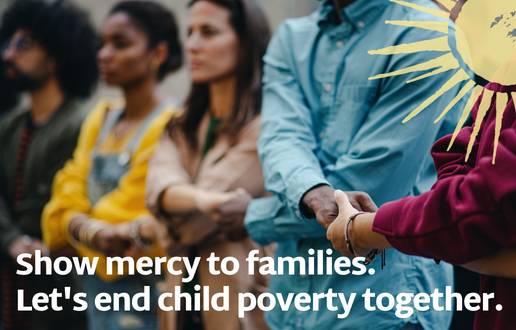

The iconic image that so many people associate with Advent is the Holy Family – the baby Jesus, Mary, and Joseph, usually huddled in a stable and surrounded by livestock.
It’s not an auspicious start for the Son of the living God. A family that has no place to stay and barely any resources to get by is something we still associate with the margins of society. It’s clear that God wants to associate with humility and poverty.
But what happens next matters. In the Gospel infancy narratives – and our Christmas holiday traditions – we see people respond to this vulnerable family with effusive displays of mercy. The shepherds come to praise him. The magi arrive with their gifts. This is how they respond to a child born into poverty.
The Corporal Works of Mercy, understood by Catholics, are: feed the hungry, give drink to the thirsty, shelter the homeless, visit the sick and imprisoned, give alms to the poor, and bury the dead. The visit of the magi brought with it not only material assistance (gold), but resources used in the care of the sick (frankincense) and the dead (myrrh). The mercy of strangers helped the Holy Family to survive on their perilous journey during the infancy of Jesus.
In Matthew’s Gospel, Jesus invokes a similar set of criteria for those who will join him in paradise. “For you saw me hungry and you fed me.” “I was a stranger and you welcomed me.” It is by participation in these concrete acts of mercy that we believe we too shall be shown mercy. And as Jesus points out, it in doing these acts of mercy that we directly encounter and come to know him, our Savior.
As Christians gather around manger displays in anticipation of another Christmas, it’s still good to reflect on how struggling families are getting by today. As with the Holy Family, it may still require the extraordinary intervention of personal strangers. Except instead of songs of praise and expensive gifts, we can offer acts of mercy through political action.
The Child Tax Credit, which was expanded in both size and scope for only one year as part of the American Rescue Plan, lifted 2.1 million children out of poverty in 2021. It stabilized the finances of more than 36 million families, including 62 million children, and resulted in 716,000 fewer Black children and 1.2 million fewer Latino children in poverty. Now NETWORK is pushing to get the Child Tax Credit once again included in the end-of-year tax package, but we need your help.
You can take action to help support the Child Tax Credit by calling your Senators. Tell them that Congress has an incredible chance to drastically reduce child poverty by ensuring the Child Tax Credit makes it into the end-of-year tax package, and you expect them to act on behalf of the children in your state.
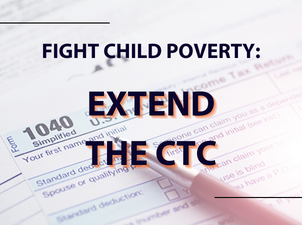

Letters to the editor (LTEs) are a powerful advocacy tool. They are among the most widely read sections of newspapers and magazines and are closely monitored by Members of Congress to find out what their voters are thinking. When LTEs are strategically coordinated and published, they can strengthen the impression of widespread support or opposition to an issue or piece of legislation. Often, they can influence editorial writers to take a stand or influence other members of the media to probe an issue more deeply. While they start out as one voice, LTEs can build a movement!
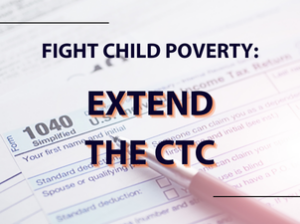 Your LTE about the Child Tax Credit is incredibly timely, as we are calling on Congress to extend the expanded Child Tax Credit before the end of the year! Also, your letter is contributing to nation-wide, targeted, multi-tactic strategy to make sure that 19 million children and their families can receive the full Child Tax Credit!
Your LTE about the Child Tax Credit is incredibly timely, as we are calling on Congress to extend the expanded Child Tax Credit before the end of the year! Also, your letter is contributing to nation-wide, targeted, multi-tactic strategy to make sure that 19 million children and their families can receive the full Child Tax Credit!
Follow guidelines of the publications to ensure you have the correct length, style, and format. Remember that most publications prefer letters to be 250 words or less.
“As a Catholic who is dedicated to living out the social mission of my Church, I am calling upon Senator Cornyn to support an expanded, fully refundable, monthly Child Tax Credit (CTC).”
“It is a moral imperative to end child poverty and hunger, and Congress has a tool do just that with the CTC. This program has a proven, transformative impact on the lives of children and families. We know that the expanded CTC led to historic reductions in child poverty, especially for Black and Latino children. However, under current law, there are over 2.1 million children—including over 1.7 million Latino and Black children–in Texas alone who are excluded from the full CTC because their families’ incomes are too low. It is not only just but common sense to make the full CTC available to these families!”
“I call on Senator Cornyn to support an expanded, fully refundable, monthly Child Tax Credit. All of Texas’ children, from the Panhandle to Dallas to the Gulf Coast, deserve to live healthy and productive lives, and the Child Tax Credit is important way to support children and families.”
For additional information about writing and submitting a letter to the editor, watch this training from former NETWORK Press Secretary Lee Morrow:
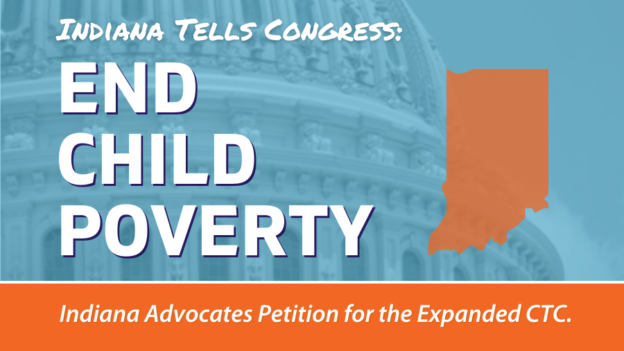

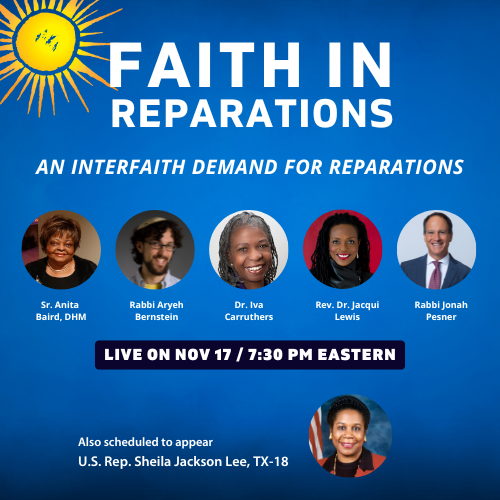
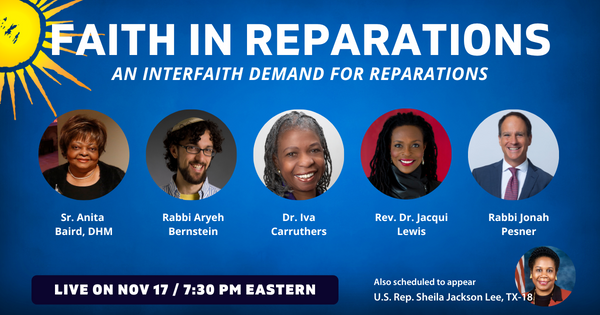
Here's an action to take after watching Faith in Reparations
NOW is the time to sign an executive order for a reparations commission.
Sister Anita Baird, DHM
Sr. Anita is a member of the Religious Congregation of the Society of the Daughters of the Heart of Mary having served as Regional Superior, Provincial Councilor, and most recently as United States Provincial. A trail blazer and history maker, Sister Anita became the first African American to serve as Chief of Staff to the Archbishop of Chicago in 1997. In 2000, Cardinal Francis George appointed her the founding director of the Archdiocese of Chicago’s Office for Racial Justice.
She is a past president of the National Black Sisters’ Conference, and recipient of the organization’s Harriet Tubman “Moses of Her People” Award. Since 2001, Anita has traveled the country preaching at parish revivals, directing retreats, and presenting anti-racism workshops.
Rabbi Aryeh Bernstein
Rabbi Aryeh Bernstein has written and taught extensively about the case for slavery reparations in Torah and Rabbinic literature, including in a 2018 article, “The Torah Case for Reparations”. Aryeh is a fifth-generation Chicago South Sider who works as National Jewish Educator for Avodah and Educational Consultant for the Jewish Council on Urban Affairs.
Aryeh is a Senior Editor of Jewschool.com and a member of the Tzedek Lab. Aryeh studied at several institutions of higher rabbinical studies and was ordained by Rabbi Daniel Landes’s Yashrut Institute.
Dr. Iva Carruthers
Dr. Iva E. Carruthers is General Secretary of the Samuel DeWitt Proctor Conference (SDPC), an interdenominational organization within the African American faith tradition focused on justice and equity issues. SDPC is both a 501c3 and United Nations Non-Governmental Organization (NGO). As founding CEO and a trustee of SDPC, she has steered the organization as a unique, influential and esteemed network of faith based advocates and activists, clergy and lay. Former director of the Black Theology Project, Dr. Carruthers has a long history of teaching, engagement in community development initiatives and social justice ministry, fostering interdenominational and interfaith dialogue and leading study tours for the university and church throughout in the United States, Caribbean, South America and Africa.
Dr. Carruthers is Professor Emeritus and former Chairperson of the Sociology Department at Northeastern Illinois University and was founding President of Nexus Unlimited, an information and educational technology firm. She was appointed to the White House Advisory Council on the internet, “National Information Infrastructure”, Mega Project and the educational software she developed was awarded a ComputerWorld Smithsonian Award. She is also founder of Lois House, an urban retreat center, Chicago, Illinois.
Rev. Dr. Jacqui Lewis
The Rev. Dr. Jacqui Lewis—Author, Activist, and Public Theologian—is the Senior Minister at Middle Collegiate Church, a multiracial, welcoming, and inclusive congregation in New York City that is driven by Love. Period. Jacqui is the author of several books, including her latest: Fierce Love: A Bold Path to Ferocious Courage and Rule Breaking Kindness That Can Heal the World. Jacqui earned her Master of Divinity from Princeton Theological Seminary and earned a M.Phil. and a Ph.D. in Psychology and Religion from Drew University. Ordained in the Presbyterian Church (USA), she is the first African American and first woman senior minister in the Collegiate Church of New York, which was founded in 1628.
Middle Church and Jacqui have been featured in media such as The TODAY Show; Good Morning America; The Takeaway; The Brian Lehrer Show; and in The Washington Post, The New York Times, and The Wall Street Journal. Her podcasts include Love.Period., which is produced by the Center for Action and Contemplation, and The Four—a fearsome faith foursome talking about Black Life, Love, Power and Joy, with Otis Moss III, Lisa Sharon Harper and Michael-Ray Mathews.
Rabbi Jonah Pesner
Rabbi Jonah Dov Pesner serves as the Director of the Religious Action Center of Reform Judaism. He has led the Religious Action Center since 2015. Rabbi Pesner also serves as Senior Vice President of the Union for Reform Judaism, a position to which he was appointed to in 2011. Named one of the most influential rabbis in America by Newsweek magazine, he is an inspirational leader and tireless advocate for social justice.
Rabbi Pesner’s work has focused on encouraging Jewish communities to reach across lines of race, class, and faith in campaigns for social justice. In 2006, he founded Just Congregations (now incorporated into the Religious Action Center), which engaged clergy, professional, and volunteer leaders in interfaith efforts in pursuit of social justice. Rabbi Pesner was a primary leader in the successful Massachusetts campaign for health care access that has provided health care coverage to hundreds of thousands and which became a nationwide model for reform. Over the course of his career, he has also led and supported campaigns for racial justice, economic opportunity, immigration reform, LGBTQ equality, human rights, and a variety of other causes. He is dedicated to building bridges to collectively confront anti-Semitism, Islamophobia, and other forms of hate and bigotry.


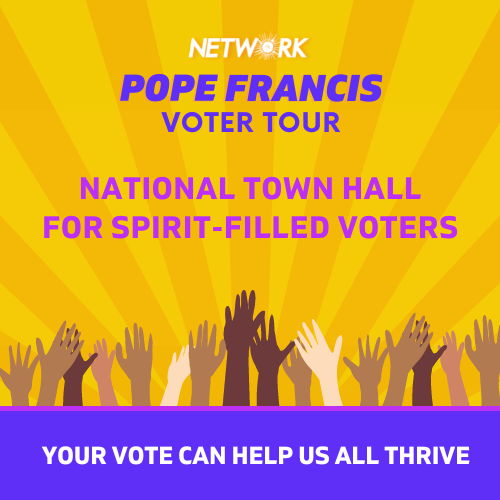
We are called to participate in politics to promote the common good. What does it look like to vote for the common good? This conversation helps us understand how important it is to use our vote to make lives better in our communities.
NETWORK’s Grassroots Mobilization team visually displays how walls are built by some politicians and corporations to divide us. The walls of division, held firm with racism, sexism, misinformation, etc., make our communities unsafe and let those who divide us rig the economy and politics for their benefit.
Our speakers explain how when we vote for the common good we can help knock down walls of division. And, when we rely on Pope Francis’ teachings, lessons learned from lived experiences–ours and those of others, our shared values, and respect for all of the issues (not one single issue, like abortion or climate change) that respect life, we can help all in our beloved community thrive.
Speakers:
Commit to using your vote as your voice to protect our democracy and promote the common good!
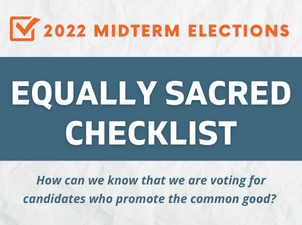

How can we know that we are voting for candidates who promote the common good? Pope Francis has given clear instructions for how Catholics and all people of good will are to position ourselves and prioritize social issues.
In his writing and speaking, Pope Francis makes it clear: abortion is not the only issue that matters. Catholics are called to be multi-issue voters in the 2022 midterm elections and in our continued participation in public life. Use the Equally Sacred Checklist as a guide to reflect on the concerns that Pope Francis says are “equally sacred” to the defense of the unborn.
Share the Equally Sacred Checklist with your friends, family, fellow activists, and faith community members.
Check out these sources to learn more about what Pope Francis says:
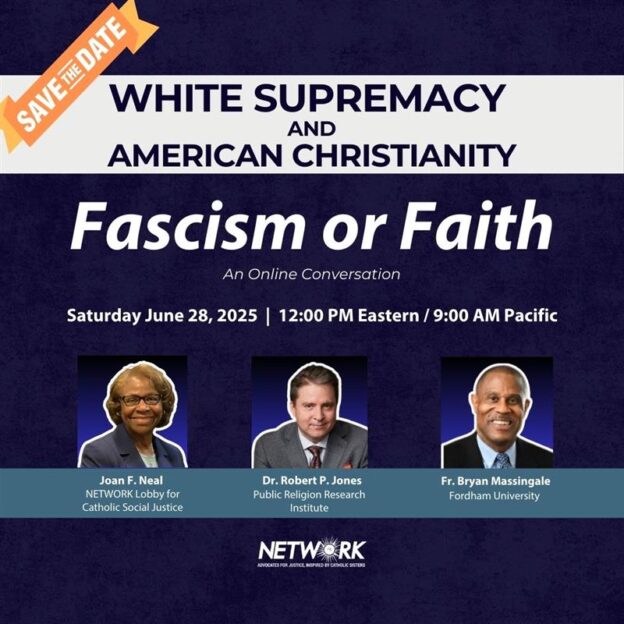
Bring the discussion to your community with messaging and resources from our NETWORK team.
NETWORK partner, the Baptist Joint Committee for Religious Liberty (BJC), released a joint project with the Freedom From Religion Foundation (FFRF) detailing Christian nationalism’s prominence in the January 6 insurrection. In it, Amanda Taylor of BJC shares, “Christian nationalism is a political ideology and cultural framework that seeks to merge American and Christian identities, distorting both the Christian faith and America’s constitutional democracy. Christian nationalism relies on the mythological founding of the United States as a ‘Christian nation,’ singled out for God’s providence in order to fulfill God’s purposes on earth. Christian nationalism demands a privileged place for Christianity in public life, buttressed by the active support of government at all levels.
Christian nationalism is not Christianity, though it is not accurate to say that Christian nationalism has nothing to do with Christianity. Christian nationalism relies on Christian imagery and language.”
With previous discussion laying out the roots, influences, and threats to democracy posed by white supremacy in our churches and politics, Fr. Bryan N. Massingale, Dr. Robert P. Jones, and NETWORK’s Joan F. Neal looked to the future and explored how we the U.S. can move beyond Christian nationalism. And young adult justice-seekers shared how they connect their work for democracy to their faith. White Supremacy and American Christianity: Moving Towards Beloved Community was a special conversation, focused on the future and the possibility of a vibrant, multi-faith, multi-racial democracy where every person can thrive, without exception.
In October 2023, ethics professor Fr. Bryan N. Massingale, author Robert P. Jones, and NETWORK’s Joan F. Neal gathered for White Supremacy and American Christianity: A Consistent Ethic of Hate Threatens Our Democracy. The country was on the precipice of a budget crisis. House extremists didn’t want to negotiate, they wanted a government shutdown–they were a threat to our democracy. Their actions, rooted in white supremacy and Christian nationalism, were positioned to harm those they view as other: Black and Brown citizens and non-English speaking Black and Brown immigrants. Instead of building a pluralistic democracy, they aimed to diminish the progress and presence of non-white people in our country and throw our government into chaos.
In October 2022, ethics professor Fr. Bryan N. Massingale and author Robert P. Jones participated in an enlightening conversation ahead of this year’s midterm for an exploration on the influence of White Supremacy in American Christianity on our politics. The conversation was moderated by NETWORK’s Joan F. Neal.
In April 2022, NETWORK engaged experts working at the intersection of racism, nationalism, and Christianity for a conversation on the poisonous effect that White Supremacy has on American Christianity. Fr. Bryan N. Massingale, Dr. Robert P. Jones, and NETWORK’s Deputy Executive Director and Chief Equity Officer Joan F. Neal were joined by Georgetown University’s Dr. Marcia Chatelain.
Darcy Hirsh is the Senior Director of Policy & Advocacy at Interfaith Alliance, (Part 3) where she leads the organization’s policy work at the local, state, and federal levels, as well as its critical advocacy in the courts.
Dr. Robert P. Jones is the President and Founder of PRRI, and author of White Too Long: The Legacy of White Supremacy in American Christianity. Robert P. Jones speaks and writes regularly on politics, culture, and religion in national media outlets including CNN, NPR, The New York Times, The Washington Post, and others. Dr. Robert Jones’s latest book is a New York Times best-seller. You can buy it here: The Hidden Roots of White Supremacy and the Path to a Shared American Future and follow Dr. Jones through his newsletter at https://www.whitetoolong.net/.
Fr. Bryan Massingale is the James and Nancy Buckman Professor of Theological and Social Ethics, as well as the Senior Ethics Fellow in Fordham’s Center for Ethics Education and author of Racial Justice and the Catholic Church. Fr. Massingale is a noted authority on social and racial justice issues, particularly in Catholic spaces. Read Fr. Massingale’s Op-Ed in National Catholic Reporter, “As the election cycle cranks up, Christians need to call out white Christian nationalism” and his keynote address at the 2022 Outreach Conference: “Intersectionality and LGBTQ Ministry”
Professor Marcia Chatelain, Ph.D., is the winner of the 2021 Pulitzer Prize in History (Part 1) her book Franchise: The Golden Arches in Black America. She is a professor of history and African American studies at Georgetown University and the leading organizer behind the #FergusonSyllabus, an online educational resource that has shaped educational conversations about racism and police brutality since 2014.
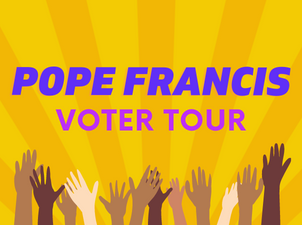

The Pope Francis Voter tour made a stop in Toledo Ohio, where we took a few days to get some much needed rest and recharge before another week of political ministry.
Our site visit for Toledo was at the Center of Hope Family Services, a family-led nonprofit organization that provides a vast array of programs and services for both youth and adults in the community. We arrived on a cloudy Monday morning and were greeted warmly by Dr. Tracee Perryman, the CEO and Co-Founder of the Center of Hope. Dr. Perryman gave us a tour of the Center’s facility that is in the process of expanding. The impressive facility includes offices, meeting spaces, a direct service and programming area, and even a recording studio! After our tour, we all sat down in their conference room to hear more about the ways the Center of Hope has been a positive change agent for the community.
The Center of Hope Family Services has been serving youths, adults and families in Toledo for 25 years. It started from Center of Hope Community Baptist Church, and thanks to its success and growth, it was able to expand into its own 501©-3 nonprofit. One of the wonderful services we learned about was their court advocacy services that helped countless young people navigate the often-complex and daunting juvenile justice system. We also learned about their ELEVATE program which serves local students from grades K-4 who are at risk for academic failure. The program was such a success that it was expanded into a published curriculum, outlining an eight month afterschool education program that helps children thrive.
After our visit, we held a Speak out in their lobby to a small group of NETWORK supporters and members, and our broader online audience. Dr. Michael Carter, a pastor, community leader and an Elevate parent who has had his children involved in the program, was a featured speaker. He shared his experience about how the ELEVATE program has benefitted his son through their homework assistance program and even some at-home cooking classes that taught him how to cook quiche and dump cakes!
Organizations like the Center of Hope Family Services are inspiring for their innovation and unwavering commitment to underserved communities. We see the Pope Francis Voter spirit alive in their efforts as they tackle the multiple issues affecting their communities. If you are interested in supporting their organization, we encourage you to visit their website: https://www.cohfs.org/
